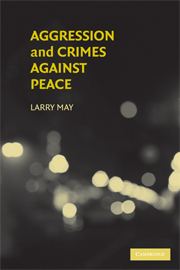Book contents
- Frontmatter
- Contents
- Acknowledgments
- PART A PACIFISM AND JUST WARS
- PART B RETHINKING THE NORMATIVE AD BELLUM PRINCIPLES
- PART C THE PRECEDENT OF NUREMBERG
- PART D CONCEPTUALIZING THE CRIME OF AGGRESSION
- 10 Defining State Aggression
- 11 Act and Circumstance in the Crime of Aggression
- 12 Individual Mens Rea and Collective Liability
- PART E HARD CASES AND CONCLUDING THOUGHTS
- Bibliography
- Index
10 - Defining State Aggression
Published online by Cambridge University Press: 13 November 2009
- Frontmatter
- Contents
- Acknowledgments
- PART A PACIFISM AND JUST WARS
- PART B RETHINKING THE NORMATIVE AD BELLUM PRINCIPLES
- PART C THE PRECEDENT OF NUREMBERG
- PART D CONCEPTUALIZING THE CRIME OF AGGRESSION
- 10 Defining State Aggression
- 11 Act and Circumstance in the Crime of Aggression
- 12 Individual Mens Rea and Collective Liability
- PART E HARD CASES AND CONCLUDING THOUGHTS
- Bibliography
- Index
Summary
That monarchs and States, at least those that consider themselves civilized, have for centuries recognized that aggressive wars and invasions violated the law of nations is evident from the fact that invariably he who started his troops on the march or his fleets over the seas to wage war has endeavored to explain and justify the act by asserting that there was no desire or intent to infringe upon the lawful rights of the attacked nations or to engage in cold-blooded conquest, but on the contrary that the hostile acts became necessary because of the enemy's disregard of its obligations; that it had violated treaties; that it held provinces or cities which in fact belonged to the attacker; or that it had mistreated or discriminated against his peaceful citizens.
“The Ministries Case Judgment”The primary purpose of the International Military Tribunal's prosecution at Nuremberg and the subsequent proceedings under Control Council Law No. 10 at Nuremberg was to prosecute Nazi leaders for crimes against peace and waging aggressive war, what was there called the “supreme international crime.” There have been no successful major international prosecutions for crimes against peace since the trials at Nuremberg and Tokyo, just as there were none before Nuremberg, because of a failure to agree about what aggression means. This history hardly seems consistent with calling the crime of aggression, or crime against peace, the supreme international crime.
- Type
- Chapter
- Information
- Aggression and Crimes Against Peace , pp. 207 - 228Publisher: Cambridge University PressPrint publication year: 2008



